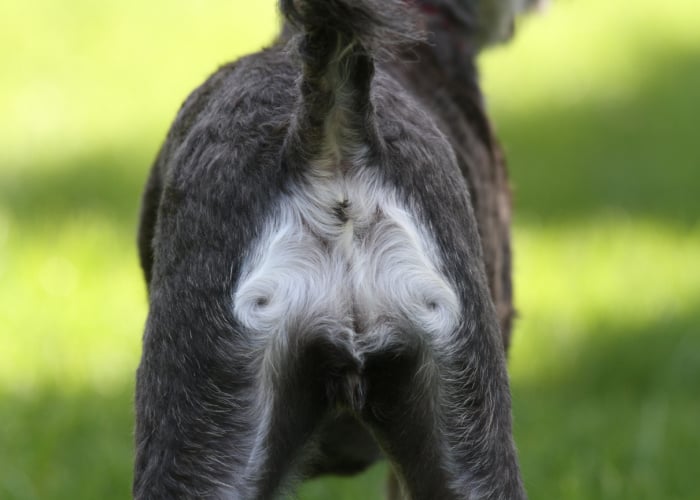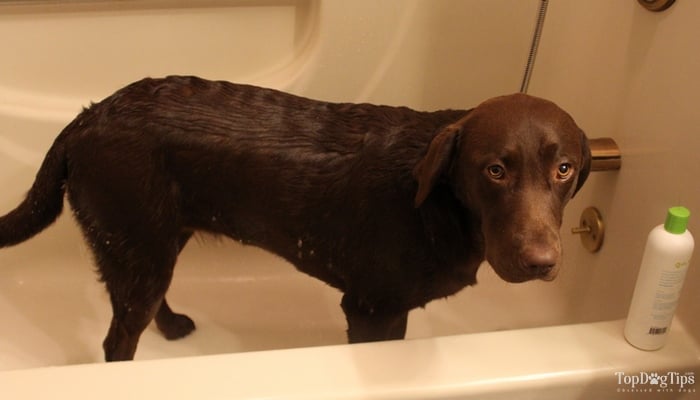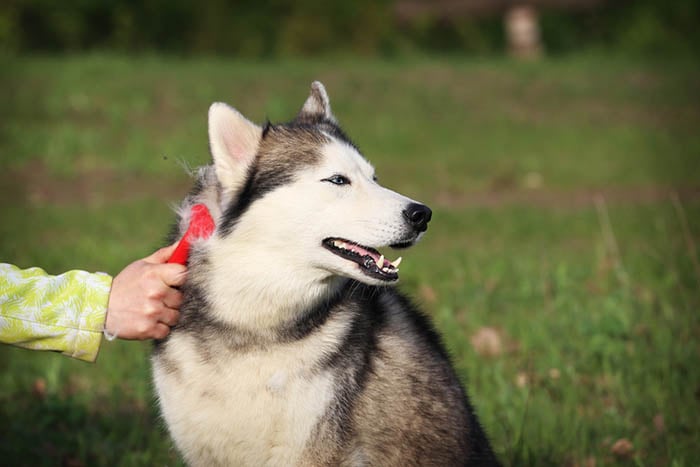I love how my dogs smell…most of the time. A “normal” smelling dog comforts me, but it can be awful when they stink.
This leaves owners begging the question, why does my dog smell bad?
Remember that all dogs have unique aromas, and some breeds are smellier than others.
Your dog’s unique smell comes from the oil on his skin.
While you may not like your pup's natural aroma as much as I do, a distinct difference exists between a dog's “normal” smell and a strong odor caused by something other than its natural oils.
Why Does My Dog Smell Bad?
12 possible reasons

1. Anal Glands
Anal glands are small sacks inside your dog's anus that are full of oil.
This oil has a fishy, gross smell. Some oil is released each time your dog has a bowel movement.
We don't normally smell the fishy odor because the odor of the dog's feces masks it.
When the glands aren't expressed naturally, the oil leaks out, and you will notice a foul odor.
When anal glands become infected, they can be painful and especially stinky.
Your veterinarian or a professional dog groomer may need to express the anal glands in order for them to begin working properly again.
2. Bedding and Toys
Make sure to wash your dog’s bedding and toys regularly.
They will start to smell, and that will affect the way your dog and your entire home smell.
Chew toys, in particular, need to be washed regularly. When your dog puts them in his mouth, his saliva is transferred to the toys.
Between the moisture and the bacteria, these toys can quickly become very smelly.
3. Diet
Poor-quality dog food can lead to an upset stomach. It's harder to digest, and the processed ingredients are hard on your pet's digestive tract.
This can lead to excessive gas, which results in lots of burping and flatulence.
To prevent this, make sure you're feeding high-protein foods made with top-quality ingredients.
You may need to try multiple brands before you find one that works well with your dog's system.
4. Doggy Breath
Bad breath in dogs results from a buildup of bacteria in their mouth.
If you don't take care of your pet's dental hygiene, it will lead to rotten teeth, horrible breath, and other more serious health problems.
Certain diseases, like diabetes and kidney disease, change the way Fido’s breath smells, too.
Diseased teeth and gums are generally the main causes of bad breath in dogs.
You should brush your pet’s teeth once daily to keep the plaque and tartar buildup at a minimum.
Make an appointment for a full dental cleaning at least once a year.
There are also dental chews and water additives that can help to keep Fido's teeth clean and his breath smelling fresh.
RELATED: How To Bathe A Dog 101 – A Step-by-Step Guide

5. Ear Infection
Dogs' ears, especially long, droopy ones like those of Basset Hounds, can gather moisture and, in turn, begin to smell foul.
Sometimes, you can eliminate the smell with a good ear cleaning.
If the smell from your dog's ears is overpowering, it could indicate an ear infection.
If this smell comes on suddenly and/or is accompanied by your dog shaking his head, whining, or scratching his ears, it is a definite sign of an ear infection.
If you suspect your pet has an ear infection, don't wait.
Seek veterinary advice immediately. If left untreated, an ear infection could permanently damage your pet's hearing.
6. Flatulence
All dogs have gas here and there. If, however, your dog has excessive or exceptionally stinky gas, there may be something wrong.
The most likely cause of excessive flatulence in dogs is a poor diet.
As I mentioned above, a poor diet leads to bad digestion, which causes excess gas to build up in your dog's digestive tract.
In rare cases, excessive gas could be a symptom of a more serious health problem.
If you haven't changed your dog's food and the flatulence seems out of nowhere, it's best to consult your vet.
A day or two of excessive gas isn't much cause for concern, but if it seems to be a regular problem, there may be a more serious issue with your pet's health.
7. Grooming
You must create a good grooming routine in order to keep your pet clean and smelling fresh.
Most dogs should have a bath every 2-3 months.
Brush your dog between baths to loosen dead skin, dirt, and debris.
Trimming your dog's coat when necessary, brushing his teeth regularly, and cleaning his ears will ensure your pet stays healthy and smells great.
8. Rolling In Something Smelly
While it seems foolish to us, dogs love rolling in anything that stinks.
Some experts think this behavior is instinctual because wild dogs will roll in strong-smelling things to mask their own scent, making it easier for them to sneak up on their prey.
Others believe dogs roll in stinky things to explore their environment.
Still, some people think that dogs enjoy smelly things and they roll in them for their own enjoyment.
MORE: Homemade Dog Grooming Kit – How To Make One

9. Skin Problems
Many skin conditions in dogs may cause a bad aroma. For example, Seborrhea, a yeast build-up on your dog's skin, smells like stinky cheese.
Breeds that have overlapping skin folds are prone to being smelly because the interior of the folds retain moisture.
This can cause dermatitis and infections. The only way to prevent this is to keep these skin flaps clean and dry.
A hormonal imbalance, a fungal infection, skin allergies, parasites, and infection can also make your dog stink.
Keep a close eye on your dog. Look for abnormal behavior, such as licking or scratching, and consult your veterinarian for advice if you think a problem exists.
10. Skunk
If your dog is unfortunate enough to be sprayed by a skunk, he'll probably smell for quite a while.
The skunk’s smell can linger for as long as a year if you don’t get it all out!
Because your dog is likely trying to sniff or attack the skunk, his face will likely take the brunt of the assault.
When this happens, rinse your dog’s eyes with cool water, and then it's time to try to get rid of the skunk smell.
There are several anti-skunk home treatments you can use to alleviate the smell of skunks, but you will need to use them more than once.
You can also buy commercial products specifically designed to tackle skunk spray on dogs.
11. Urinary Tract Infection
A strong urine scent on your dog may reveal a urinary tract infection. These are more common than you may think.
Other signs of an infection include increased thirst, more frequent urination with only a small amount coming out, or signs that your pet feels pain while urinating.
Any abnormal urine smell from your dog should be reported to the vet.
This smell might also occur in dogs with incontinence, diabetes, fungal infections, kidney stones, or kidney disease.
12. Wet Dog
Your pooch may smell perfectly fine before a bath, but during and after the bath, it is completely different.
Wet dogs smell bad because washing them releases old oil, yeast, dirt, and other microorganisms into their fur. Once your dog has fully dried, this smell should go away.
READ MORE: Is A Dog's Tail A Bone? Can A Dog Break His Tail?












